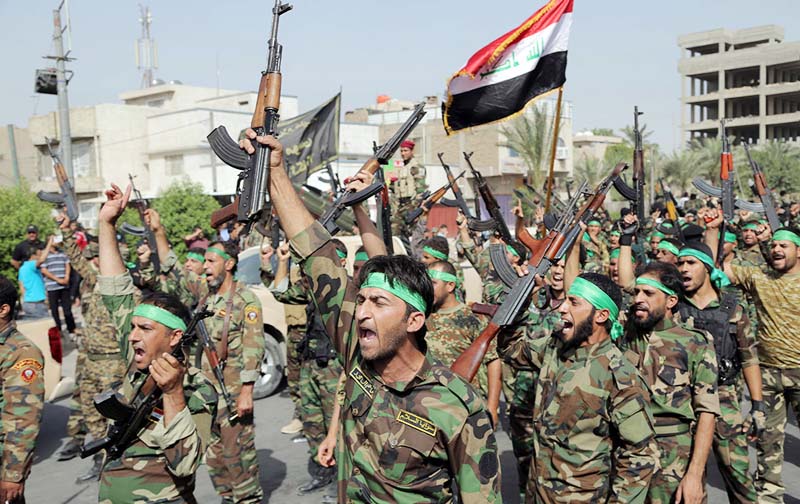
BBC Online :
Thousands of Shia militia loyal to the powerful cleric Moqtada al-Sadr have paraded through the streets of Baghdad, raising sectarian tensions amid continued fighting in areas of Iraq.
The cleric, whose Mehdi Army fought the US in Iraq for years, had called for a military parade across the country.
Correspondents say the show of force will be seen as a very disturbing development by the Baghdad government.
Sunni extremists have seized control of large swathes of territory across Iraq.
On Saturday, the militants – led by jihadist group Isis – were reported to have seized a strategically important border crossing to Syria, near the town of Qaim, killing 30 troops after a day-long battle.
Fergal Keane reports: “Isis suspects surrender (to the Kurdish snipers) and are made to strip for fear they are wearing suicide vests”
Thousands of largely Shia Iraqis have volunteered to fight Isis, urged on by a call from the country’s highest Shia religious authority, Grand Ayatollah Ali al-Sistani.
But the BBC’s Jim Muir, in northern Iraq, says the impressive-looking parade of men in battle fatigues accompanied by serious military hardware will only raise sectarian tensions at at time when the government is under pressure to rally the country together against the extremists.
US Secretary of State John Kerry is expected to travel to Iraq soon to press for a more representative cabinet, hoping this could ease tensions between the country’s rival Muslim sects.
Meanwhile, US President Barack Obama said Isis – which has an estimated 10,000 fighters in Iraq and Syria – had exploited a power vacuum in Syria to amass arms and resources, but denied this was because the US had not moved to back moderate rebel forces fighting President Bashar Assad.
“We have spent a lot of time trying to work with a moderate opposition in Syria, but… when you get farmers and dentists and folks who have never fought before going up against a ruthless opposition in Assad, the notion that they were in a position suddenly to overturn not only Assad but also ruthless, highly-trained jihadists if we just sent a few arms is a fantasy,” he told CBS News.
The US, which pulled out of Iraq in 2011, is sending some 300 military advisers to Iraq to help in the fight against the insurgents there. But in the face of Iraqi calls for US air strikes, the White House is insisting that there is no purely military solution to the crisis.
The BBC’s John Simpson, in Baghdad, says Obama believes Iraqi PM Nouri Maliki has endangered the country by ignoring Sunni concerns and governing in the interests of the Shia majority.
Grand Ayatollah Ali al-Sistani’s call for a new government to be quickly formed aiming for “broad national acceptance” and to “remedy past mistakes” is being seen as less-than-veiled criticism of the Iraqi PM, correspondents say.
The UN estimates that about one million people have been displaced within Iraq as a result of violence this year.
About 500,000 people fled their homes in the country’s second-largest city, Mosul, which Isis captured last week.

